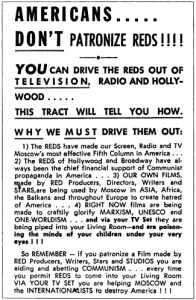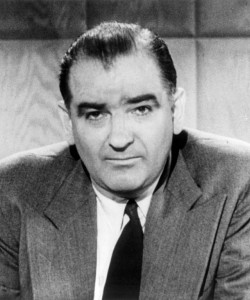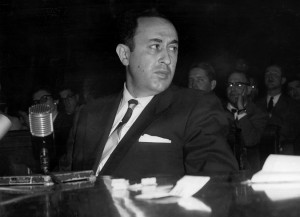By: Zach Kalman’17
Ivy Meeropol, granddaughter of Julius and Ethel Rosenberg, directed and produced the documentary, “Heir to an Execution” (2004). The documentary presents a first hand account of Ivy as she investigates what actually happened to her family back in 1953. She interviews members of her own family including her father, Michael Meeropol who is the son of Julius and Ethel Rosenberg. Ivy also interviews several friends of her grandparents colleagues including, Miriam Moskowitz and Morty Sorbell who both have a first hand account of the events surrounding what happened to Julius and Ethel Rosenberg.
The documentary strikingly makes evident the significance of the involvement of Jews in politics during this time period. As Ivy interviewed Morton Sobell he spoke about the feeling of having, “social responsibility” for others during the economic struggles surrounding WWII. He describes how Julius and Ethel, “dreamed of a socialist world, with no hunger, and that the Soviet Union was a model for that world.” When speaking to my grandfather Sheldon Lyons, who grew up during this time period in Brooklyn, he told me that one of the reasons so many Jews were involved in the communist movement was because they saw the effects socialism had on their homelands like Poland and Russia and were inspired by the results of this “collectivism” to help assist the poor. He also made a clear distinction that the wealthy, established Jews did not follow this rhetoric and there was a clear class distinction between those who supported socialism and those who did not.
This distinction between the two classes of Jews is evident in “Heir to an Execution” as well. Ivy makes a clear point to highlight the harsh decisions of Jewish lawyers and judges had in the trials of Julius and Ethel. In fact, Ivy makes a point of saying that a Catholic judge, responsible for giving custody of Ivy’s father and her brother to their grandmother, which was their “first victory in court.” This raises the question, why were some Jews so hard on Julius and Ethel? In response to this question, my grandfather said that when the verdict came out that the Rosenberg’s were Soviet spy’s, his father who had served in WWI for the Untied States felt that he was betrayed by the Rosenberg’s. He, like many others felt betrayed because he had supported the United States in war and at home but now people would associate him with traitors. All of a sudden, a new wave of anti-Semitism rose in the United States in which people blamed Jews for being socialists and aligning with the Soviets.
McCarthyism, which gets its name from Republican Senator Joseph McCarthy, led an effort beginning in 1950 that accused many Americans of supporting communism and engaging in treason. McCarthy first unveiled this rhetoric in a speech in February of 1950 in which he stated he had a list of 205 known Communists who were, “working and shaping policy” (History.com) in the US State Department. McCarthyism was especially anti-Semitic in its treatment of the television industry and Hollywood, places that many Jews worked in. An example of this McCarthyism targeting the entertainment industry and thus targeting Jews can be seen in this anti-Communist poster from the 1950s below. McCarthy was also responsible what is known as the “Hollywood Blacklist” which was the denying of employment to screenwriters, actors, directors, musicians, and other U.S. entertainment professionals because of their suspected political beliefs or associations.

Example of McCarthyism literature specifically addressing the entertainment industry. (Courtesy of Wikipedia)
In his second term in as Senator McCarthy was put in charge of the Committee on Government Operations, “which allowed him to launch even more expansive investigations of the alleged communist infiltration of the federal government”(History.com). This once again turned into area of large anti-Semitism and a “blatant violation”(History.com) of civil rights. An example of this can be found in the treatment of Dr. Irving Peress, “a New York dentist who had been drafted into the Army and became the beneficiary of a seemingly routine promotion from captain to major” (Roberts). Peress’s promotion became anything but “routine,” it instead involved a televised congressional investigation all because McCarthy thought he was a Communist. Sam Roberts writes that, “McCarthy contended that Dr. Peress’s promotion had been directed by a ‘silent master who decreed special treatment for Communists.’ Dr. Peress, represented ‘the key to the deliberate Communist infiltration of our armed forces.’ McCarthy called him a ‘Fifth Amendment Communist’”(Roberts). This outlandish treatment by McCarthy during these trials ended up costing him his job in the Senate as, “a showdown with the White House and, later that year, censure by the Senate” (Roberts). Before all was set and done, McCarthy’s trial of Peress caused “several top Army officials, cost Dr. Peress much of his private dental practice in Queens and even drove his wife, Elaine, to resign”(Roberts).
It is clear that following the trial of the Rosenberg’s a new wave of anti-Semitism was brought about it the Untied States and McCarthyism had a lot to do with it. McCarthyism represented a total breach of civil liberties in which people like Dr. Peress were signaled out randomly based on McCarthy’s feelings at the time. Much of the time the left-of center Jews got the harshest of the blame whether that be in Congress or the entertainment industry. McCarthyism represents dark side of what happens when the government is given the power to investigate without oversight.
Citation:
Roberts, Sam “Dr. Irving Peress, Target of McCarthy Crusade, Dies at 97.” The New York Times,17 Nov. 2014.
Heir to an Execution. Dir. Ivy Meeropol. Blowback Productions, 2004. DVD.
“Joseph R. McCarthy.” History.com. A&E Television Networks, 2009. Web. 20 Nov. 2014.




Leave a Reply